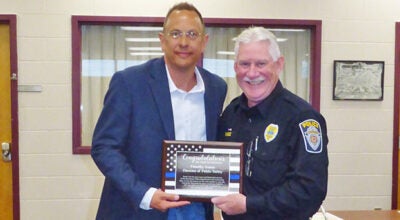Berrien County leaders discuss racism, justice in healthcare
Published 3:28 pm Wednesday, September 30, 2020
|
Getting your Trinity Audio player ready...
|
BERRIEN COUNTY — Berrien County healthcare representatives logged online Tuesday evening to discuss racism, justice and healthcare disparities.
The Zoom event, which had 55 participants listening in, was hosted by Southwest Michigan Advocates and Leaders for Police and Community Trust, Michigan Department of Civil Rights and Interfaith Action, lasted just over an hour and a half and allowed representatives to speak about their organization’s approach to issues and what they want to see moving forward. Questions were taken between each speaker.
Five organizations were represented in the discussion including the Berrien County Health Department, Spectrum Lakeland Health, InterCare Community Care Health, Cass Family Clinic Network, Riverwood Center and the Sacred Heart Rehabilitation Center.
Mary Jo Schnell, executive director of The OutCenter, located in Benton Harbor, spoke up often during the meeting drawing parallels between the intersections of LGBTQ persons and the issues also dealt with by people of color in healthcare systems.
Sid Mohn, from Interfaith Action, hosted the session and asked for respectful discussion between attendees.
“[I ask that] we all take a spirit of ‘how do we come together?’ to birth greater justice in our community and address on a collaborative and proactive basis, discrepancies and disparities within our healthcare system,” Mohn said.
Participant Brian Keith asked the moderators to define “systemic racism” for the attendees.
Moderator Charmae Sanders read the definition offered up by Gillian Conrad, communications manager for the BCHD.
“[The BCHD] uses the following definition, which is adapted by the American Public Health Association,” Conrad said. “Racism is a system of structuring opportunity and assigning value based on the social interpretation how one looks, which is what we call race, that unfairly disadvantages some individuals and communities, unfairly advantages other individuals and communities, and saps the strength of the whole society through the waste of human resources.”
The discussion began with Conrad.
“Racism and institutional racism have not been recently identified as an issue that undergirds many of the issues of public health issues that we see, but in fact it’s something we have been aware of and are working to address for many decades now,” Conrad said. “We know that systemic racism, scientific research points to racism as a predominant root cause of many of the health inequalities we see, particularly when we look at the social determinants of health.”
Conrad mentioned things like housing, education, employment, access to healthcare and access to healthy foods.
Chief Executive Officer of the Cassopolis Family Clinic Network Mary Middleton also participated showing representation from the south county area.
“One of the issues in Niles that effected entire community, not just the communities of color, was access to primary care for people who had Medicaid or for people who were uninsured,” Middleton said. “We were able to accept new patients during COVID.”
She said her clinic does not inquire about race or insurance when patients call looking or guidance or medical treatment.
“We do our best to get them in and make them our patient and take care of the whole patient,” she said.
Middleton spoke about concerns about the Affordable Care Act coming up on the schedule in the Supreme Court of the U.S., and what that will mean for access to healthcare. She said the Cass Family Network Clinic offers discounts, but if they have to refer out, the discounts and sliding scale offering do not follow the referrals.
Jerry Price, manager of diversity and inclusion with Spectrum Healthcare Lakeland, said his team has been working the issue for a number of years. He acknowledged the current pandemic shed light on how issues disproportionately have affected people of color in the U.S.
COVID-19 does see income, ethnicity, race. It sees a lack and a gap in treatment, care of chronic healthcare diseases and it exploits that,” Price said.
This is the first of four discussion events to be hosted by Southwest Michigan ALPACT, according to its Facebook page. The next will be hosted on the topic of education on Oct. 13.







